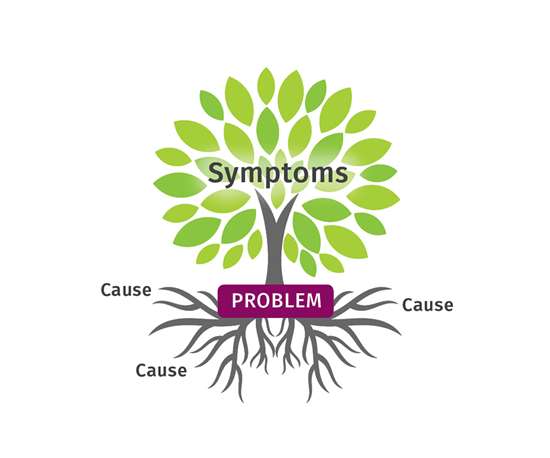
A lot of people are quick to spot treat a problem without really understanding the reason for the problem. If you’re one of those, you’re not alone. It’s the way of the Western medical model to spot treat. What I mean by spot treating is something like popping a couple ibuprofen for a headache instead of actually figuring out what is causing the headache.
But isn’t the ultimate point of relieving symptoms to try and make sure we never have them again? I can tell you that so long as you keep addressing the symptom without finding the root cause, that symptom is going to come back again and again.
There’s a way around this issue. But for us to address this symptom of the modern Western medical model, we’re going to have to look at its root cause.
In East Asian Medicine, there is the concept of root and branch treatments. If somebody comes to me and is seeking treatment for insomnia, that person is asking for a branch treatment. I can certainly do a branch treatment, but it will probably not be very effective. But if I do a complete intake on the person and determine that there is an underlying pattern of liver qi stagnation, I can then provide a treatment that will address both the branches and the root, which ultimately gives better and more lasting results.
Liver qi stagnation, like all other East Asian Medicine patterns, isn’t just an insomnia-related pattern. Liver qi stagnation can impact everything from mental health to digestion, musculoskeletal pain to erectile dysfunction. So if liver qi stagnation is preventing the patient from sleeping, chances are good that the pattern has been present long before the patient started experiencing insomnia. This is where East Asian Medicine excels…finding the root of the problem.
Let me be clear, I am not anti-Western medicine. Western medicine is great for acute conditions. An example would be, you fall and break your arm and you need a cast. You need a reactive treatment or a spot treatment because there is a concrete cause. However, it’s in chronic conditions and preventative medicine that Western Medicine begins to lose its footing.
The go to for Western Medicine is spot treatments with patchwork prescriptions. Let’s take the example above, insomnia. You go to see your doctor and he prescribes some sort of sleep aid like Lunesta. You start taking the prescription and everything seems to be working well, for a couple of months. You then go back to your doctor for a checkup and you inform him that now you’re having regular headaches that weren’t there before. He prescribes another drug, Imitrex. It helps temporarily. You go back for another checkup and now you’re complaining of dizziness. And what happens? You guessed it…another prescription, probably Meclizine. So in the course of a year, you’ve gone from having difficulty sleeping to being on three different medications. And two of those medications are to counter the side effects of the sleeping pill. This is a patchwork prescription.
There is a blind spot in spot treating a condition. That blind spot is in the understanding of the symptom. In Western Medicine, a symptom is seen as a problem to be fixed. And often, the symptom can be muffled or treated successfully for a short time. But what if that symptom is your body signaling you to something deeper that needs attention? Symptoms aren’t the problem themselves. They are our bodies alerting us that there is a problem. Most cases can be drastically improved if instead of just treating the symptom, we ask ourselves, “What is the root of this and how can I address that as well.”
This is where we have to go deep and really look honestly at everything that is affecting us daily. This is where slow medicine or East Asian Medicine comes in. Any East Asian Medicine practitioner worth their weight, will talk to their patients about slowing down and taking time to listen to your body. Instead of pounding an energy drink or a pot of coffee every morning, push yourself to go to bed early enough so that your body has time to rejuvenate. Instead of eating a fast food diet, provide your body with healthy whole foods that take a little longer to prepare. Instead of pushing yourself to get everything done, allow your body some time each day to relax and renew. The laundry will still be there…I promise.
And probably the most important suggestion of all, get help. This means that you need to find the right health allies to be on your team. Allies will help you see your blind spots and give suggestions that can be life changing. Sometimes even the slightest tweak can make a huge difference in your daily life. And when you’re too close to the subject matter, you can sometimes benefit from having a fresh pair of eyes to help.

